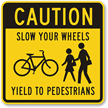Congestion charge to counter pollution in Shanghai possible
In an attempt to reduce traffic volume and control soaring levels of air pollution, Shanghai officials may soon impose a congestion charge at peak hours. If this type of road pricing is levied, Shanghai would be the first city in China to implement such a move. Similar initiatives in London and Singapore have been successful (though similar efforts in New York City failed to get off the ground).
The proposal is part of a white paper that lists out measures to limit the number of cars within 2.5 million in central Shanghai. However, it will not be easy implementing this policy, as the city is one of the most populated in the world.
Congestion charge as part of strict air-pollution policies
City officials have also aimed at a 20 percent reduction of PM2.5 levels by 2017. Gao Yiyi, an official with the Shanghai Municipal Transport and Port Authority says, “Vehicles are a big reason behind the increase in PM2.5 and pollution levels and this is an area of a lot of public concern. Heavy polluting vehicles is an area where we will strongly control.”
Heavy traffic has increased commuting time — peak-hour travel speed in Shanghai is only 11.5 meters per hour. According to Shen Xiaosu, deputy director of Shanghai Urban Construction and Communications Commission, “Traffic jams last longer than they used to, and the situation in the viaducts has also been deteriorating, especially during the weekends.”
Meanwhile, Shanghai municipality is working out a plan to upgrade the public transport system to a world-class level.
After the congestion charge was introduced in London in 2003, 50,000 less cars now enter the city, and traffic delays have been reduced by 60 percent. Besides improving traffic conditions, the venture has also generated good revenues. Moreover, road users have now opened up to alternative forms of transport like motorcycles and bicycles.
Air pollution in China severe
China is the world’s largest CO2 emitter and accounts for around one-quarter of the world’s carbon emissions. Incidentally, World Health Organization’s classification of outdoor air pollution, as a leading cause of cancer, coincides with Greenpeace’s recent report. The report reveals that 83,500 people died prematurely in 2011 from respiratory diseases in China’s top three coal-consuming provinces.
The government recently shut down several coal-fuelled power plans amidst severe political pressure. Beijing has reintroduced the rule to keep every alternate day car-free (previously implemented during 2008 Olympics) whenever pollution levels reach the peak. The Chinese government has also planned to come out with a monthly “shaming list” of the top ten polluted cities in the country, so that humiliated local authorities will push for constructive environmental action in their zones.
Category: Enforcement, Traffic law, Trends




















Comments (1)
Sites That Link to this Post